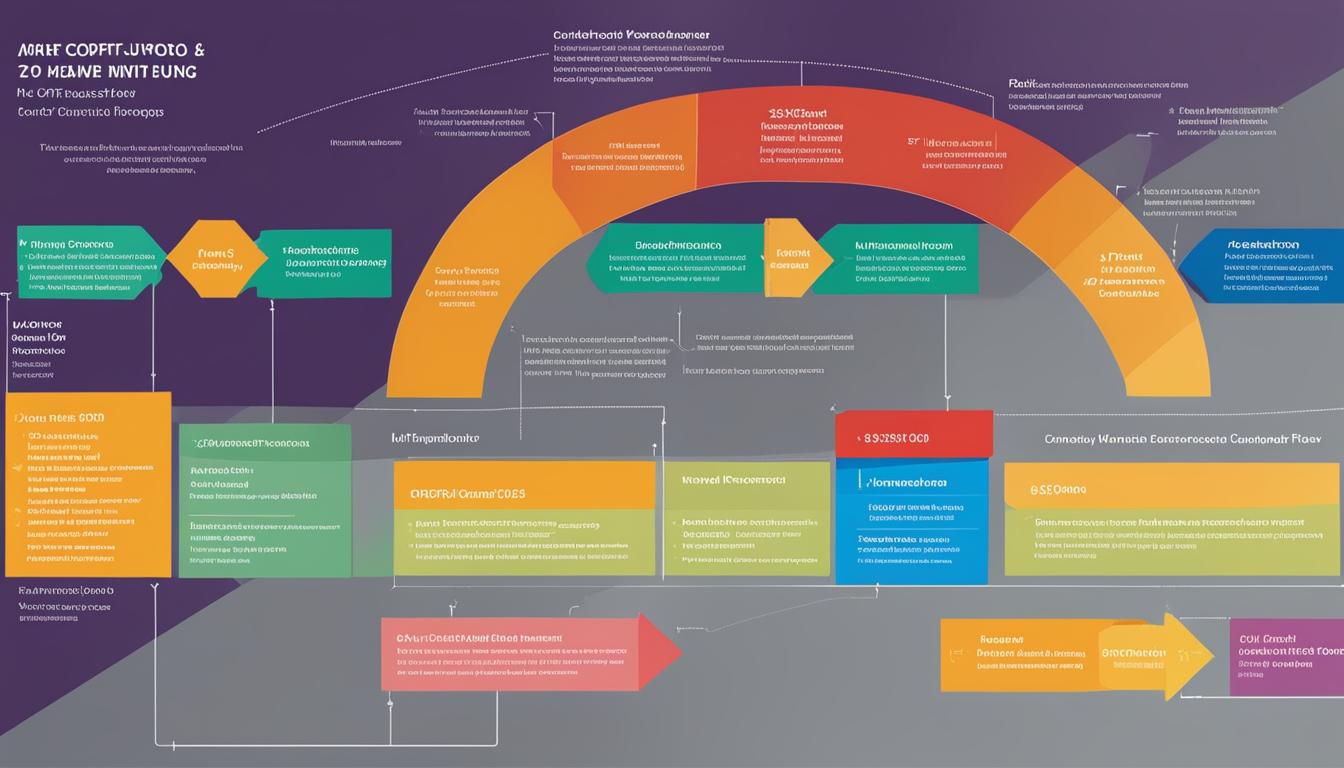Nonprofit organizations play a vital role in society, driven by their mission to serve the community and make a positive impact. However, managing the financial aspects of a nonprofit can be complex. This comprehensive guide will explain the importance of non-profit bookkeeping and provide insights into best practices and solutions for effective financial management in mission-driven organizations.
Key Takeaways:
- Nonprofit accounting is a unique financial management and recordkeeping system used by charitable organizations.
- It involves planning, recording, and reporting on finances to ensure transparency and accountability.
- Nonprofit accounting follows specific rules and procedures to track and allocate funds in accordance with donor intent.
- Fund accounting is used by nonprofits to track and report on their financial activities.
- Financial statements and reports provide insights into the organization’s financial health and cash flow management.
What is Nonprofit Accounting?
Nonprofit accounting is a unique financial management and recordkeeping system used by charitable and mission-driven nonprofit organizations. It involves planning, recording, and reporting on finances to ensure transparency and accountability. Unlike for-profit businesses that focus on generating profits, nonprofits prioritize accountability to their donors and stakeholders. Nonprofit accounting follows a set of rules and procedures specific to the nonprofit sector to track and allocate funds in accordance with donor intent.
Nonprofit accounting plays a crucial role in enabling nonprofit organizations to fulfill their missions effectively. By implementing sound financial practices, nonprofits can maintain the trust of their donors and stakeholders while efficiently managing their resources.
At its core, nonprofit accounting goes beyond the simple tracking of income and expenses. It encompasses the systematic management of financial data, adherence to regulatory requirements, and the production of accurate financial statements and reports.
Nonprofit organizations rely on transparent and ethical financial practices to demonstrate their commitment to fulfilling their missions while ensuring responsible stewardship of the funds entrusted to them.
“Nonprofit accounting serves as the backbone of financial management, providing nonprofits with the information and insights necessary to make informed decisions and drive positive change.”
Nonprofit accounting involves several key components:
- Revenue and Expense Tracking: Nonprofits track all sources of revenue, including donations, grants, and program fees, as well as expenses such as salaries, rent, and program-related costs.
- Budgeting and Financial Planning: Nonprofit organizations develop budgets to allocate resources efficiently and plan for future financial needs.
- Financial Reporting: Nonprofits produce financial statements and reports to provide stakeholders with a clear understanding of the organization’s financial health and performance.
- Fund Accounting: Nonprofits use fund accounting to track and report on funds designated for specific purposes, ensuring the proper allocation of resources as per donor restrictions.
- Compliance and Regulation: Nonprofit accounting adheres to accounting standards and regulations specific to the nonprofit sector, ensuring transparency and accountability.
The Role of Nonprofit Accounting Software
Nonprofit organizations can leverage accounting software designed specifically for their unique needs. This software automates financial processes, streamlines reporting and compliance, and enables accurate financial tracking.
Accounting software for nonprofits often includes features such as:
- Fund accounting functionality
- Donor management tools
- Budgeting and forecasting capabilities
- Financial reporting and statement generation
- Integration with other systems, such as fundraising software
By utilizing nonprofit accounting software, organizations can reduce manual errors, improve efficiency, and gain real-time visibility into their financial data.
Nonprofit accounting is a critical component of financial management for mission-driven organizations. By implementing effective accounting practices and leveraging technology solutions, nonprofits can ensure transparency, accountability, and responsible stewardship of their resources.
Nonprofit Accounting Basics
Nonprofit accounting is crucial for mission-driven organizations to effectively manage their financial resources and ensure transparency, accountability, and responsible financial stewardship. While nonprofit accounting shares fundamental principles with for-profit organizations, there are key differences that cater specifically to the unique needs of nonprofit entities.
Nonprofit accounting involves various tasks and processes that contribute to financial management and reporting. Here are the essential components of nonprofit accounting:
Budgeting
In nonprofit accounting, budgeting plays a critical role in planning and allocating funds effectively. Nonprofit organizations set budgets to establish financial goals and guidelines for their operations. By creating a comprehensive budget, nonprofits can align their expenses with their initiatives, ensuring that financial resources are optimally utilized to fulfill their mission.
Tracking Revenue and Expenses
Tracking revenue and expenses is another crucial aspect of nonprofit accounting. In order to maintain transparency and accountability, nonprofits need to record all sources of revenue, including donations, grants, and program fees. Similarly, tracking expenses such as salaries, program costs, and administrative expenses allows nonprofits to monitor how funds are used and ensure compliance with donor restrictions and internal financial policies.
Financial Statement Generation
Nonprofit accounting involves generating various financial statements that provide a comprehensive overview of an organization’s financial health and activities. These statements include:
- Statement of Financial Position (Balance Sheet) – This statement provides a snapshot of an organization’s financial status at a specific point in time. It showcases the organization’s assets, liabilities, and net assets.
- Statement of Activities (Income Statement) – The statement of activities displays an organization’s revenue, expenses, gains, and losses over a specific period. It outlines the net income or loss incurred by the nonprofit during that time.
- Statement of Cash Flows – This statement tracks the movement of cash into and out of the organization. It outlines the organization’s cash inflows and outflows from operating activities, investing activities, and financing activities.
These financial statements are crucial for demonstrating an organization’s financial transparency, evaluating its financial performance, and providing stakeholders with reliable information to make informed decisions.
By adhering to proper nonprofit accounting practices, organizations can maintain accurate financial records, effectively track their finances, and make informed decisions to achieve their mission and benefit their communities.
The Importance of Fund Accounting for Nonprofits
Nonprofits rely on fund accounting, a specialized method, to track and report their financial activities. With fund accounting, nonprofits can effectively separate and allocate funds based on donor restrictions, ensuring that donations are utilized as intended. This approach provides a clear overview of how funds are allocated within the organization.
Fund accounting plays a significant role in helping nonprofits measure their performance and financial sustainability. By accurately tracking fund allocations, nonprofits can gauge the effectiveness of their programs and make strategic decisions to optimize their impact. Additionally, fund accounting enables nonprofits to demonstrate transparency and accountability to stakeholders by providing detailed reports on how funds are utilized.
To streamline their financial management processes, many nonprofit organizations rely on specialized accounting software and solutions specifically designed for fund accounting. These tools automate tasks and simplify the tracking and reporting of financial activities. By leveraging these technologies, nonprofits can save time, reduce errors, and enhance overall efficiency.
The Benefits of Fund Accounting:
- Accurate tracking and allocation of funds based on donor restrictions
- Enhanced financial transparency and accountability
- Insights into performance and financial sustainability
- Streamlined financial management processes with specialized software
With the use of fund accounting, nonprofit organizations can ensure responsible financial stewardship and effectively support their mission-driven initiatives.
Fund accounting allows nonprofits to allocate funds in a way that aligns with their mission and donor intent. By tracking and reporting on financial activities with precision, nonprofits can build trust and demonstrate their commitment to transparency.
| Benefits of Fund Accounting | Explanation |
|---|---|
| Accurate fund tracking | Nonprofits can easily track and monitor how funds are utilized, ensuring compliance with donor restrictions and legal requirements. |
| Transparency and accountability | Fund accounting provides comprehensive reports that showcase how funds are allocated, fostering trust and confidence among stakeholders. |
| Performance measurement | By analyzing fund allocations and related outcomes, nonprofits can assess the effectiveness of their programs and make informed decisions. |
| Efficient financial management | Specialized accounting software simplifies and automates fund accounting processes, saving time and reducing errors. |
Nonprofit Accounting Statements and Reports
Nonprofit organizations produce several financial statements and reports to fulfill reporting requirements and provide transparency to stakeholders. These statements offer valuable insights into the organization’s financial health, revenue and expense tracking, and cash flow management.
The Statement of Financial Position (Balance Sheet)
The statement of financial position, also known as the balance sheet, provides a snapshot of an organization’s financial condition at a specific point in time. It presents the organization’s assets, liabilities, and net assets, indicating its financial position and overall worth. The balance sheet helps stakeholders understand the nonprofit’s liquidity, solvency, and financial stability.
The Statement of Activities (Income Statement)
The statement of activities, also referred to as the income statement, reveals the nonprofit’s revenues and expenses during a given period. It showcases the organization’s financial performance, including sources of revenue, program and administrative expenses, and any surplus or deficit. By analyzing the income statement, stakeholders can evaluate the organization’s financial sustainability and efficiency.
The Statement of Functional Expenses
The statement of functional expenses breaks down the nonprofit’s expenses by program, administration, and fundraising activities. It provides a detailed analysis of how the organization allocates its resources and highlights its commitment to transparency. Stakeholders can assess the organization’s spending priorities and evaluate the effectiveness of its programs.
The Statement of Cash Flows
The statement of cash flows tracks the nonprofit’s cash inflows and outflows, illustrating how cash is generated and utilized. It categorizes cash flows into operating activities, investing activities, and financing activities. The statement of cash flows helps stakeholders understand the organization’s ability to generate cash, manage liquidity, and invest in future growth.
These financial statements, together with additional reports and disclosures, empower stakeholders to make informed decisions, assess the organization’s financial performance, and hold its management accountable.
“Financial statements provide valuable insights into a nonprofit organization’s financial health and help stakeholders understand its financial stability and how resources are allocated.”
Creating accurate and informative financial statements requires attention to detail, adherence to accounting standards, and the use of reliable accounting software designed for nonprofits. Software solutions streamline the reporting process and facilitate accurate data analysis for better decision-making.
| Benefits of Nonprofit Accounting Statements and Reports | Challenges of Nonprofit Accounting Statements and Reports |
|---|---|
|
|
Best Practices for Nonprofit Accounting
Nonprofit organizations can greatly benefit from implementing best practices in their financial management. By following these guidelines, nonprofits can ensure transparency, build donor trust, and drive mission success. Here are some key best practices for nonprofit accounting:
- Implement strong internal controls: Establishing robust internal controls helps prevent financial fraud and ensures the organization’s funds are used appropriately. This includes procedures such as segregation of duties, regular review of financial transactions, and implementing checks and balances.
- Separate financial duties: To maintain transparency and prevent conflicts of interest, it is important to separate financial duties among different individuals or departments. This ensures that no single person has control over every aspect of the financial processes.
- Conduct regular audits: Regular audits by an independent third party provide an objective assessment of financial records, identify potential issues, and help maintain compliance with industry regulations and standards.
- Utilize accounting software and technology: Nonprofit accounting software can streamline financial processes, automate recordkeeping, and generate accurate reports. It can also help track donations, manage budgets, and facilitate compliance with accounting regulations.
- Engage in strategic budgeting: Developing a comprehensive budget that aligns with the organization’s mission and goals is crucial for effective financial management. Regularly review and update the budget to adapt to changing circumstances and ensure financial sustainability.
- Maintain transparent and ethical financial practices: Nonprofits must adhere to ethical standards and maintain transparency in their financial practices. This includes providing clear and accurate financial reports to stakeholders, disclosing relevant information, and ensuring compliance with applicable laws and regulations.
Following these best practices can help nonprofit organizations maintain financial stability, build strong relationships with donors and stakeholders, and drive their mission forward.
“Implementing strong internal controls and utilizing accounting software are essential for the financial health of nonprofit organizations. Transparency and ethical practices build trust with donors and ensure funds are used responsibly.”
Implementing Best Practices: A Case Study
To better understand the impact of following best practices, let’s consider the case of XYZ Foundation, a nonprofit organization dedicated to environmental conservation. XYZ Foundation recognized the importance of effective financial management and implemented the best practices mentioned above.
| Best Practice | Implementation | Results |
|---|---|---|
| Implementing strong internal controls | Established clear policies and procedures, segregated financial duties, and conducted regular internal audits. | Reduced the risk of fraud, improved financial accuracy, and increased accountability. |
| Utilizing accounting software and technology | Invested in a comprehensive nonprofit accounting software that streamlined financial processes, facilitated budgeting, and improved reporting capabilities. | Efficient financial management, improved data accuracy, and enhanced reporting for decision-making. |
| Maintaining transparent and ethical financial practices | Ensured accurate and timely financial reporting, communicated financial information to stakeholders, and adhered to ethical standards. | Increased donor trust, strengthened relationships with stakeholders, and improved the organization’s reputation. |
By implementing best practices, XYZ Foundation was able to effectively manage its financial resources, maintain transparency, and achieve its mission of environmental conservation.
Hiring vs. Outsourcing Nonprofit Accounting
Nonprofit organizations often face the decision of whether to hire an in-house accounting team or outsource their accounting needs to specialized nonprofit accounting services. Both options have their advantages and considerations, and the decision ultimately depends on the organization’s specific needs and resources.
When considering hiring an in-house team, one of the primary advantages is the direct control and in-depth expertise they can provide. Having an in-house team allows for better collaboration and immediate access to financial information. However, it’s essential to consider the costs and time involved in recruiting, hiring, and managing a team. This option may require investing in training and ongoing education to keep up with the latest accounting practices and regulations.
“Having an in-house accounting team allows for greater control and immediate access to financial information.”
On the other hand, outsourcing accounting services can offer several benefits to nonprofit organizations. One significant advantage is cost savings. By outsourcing, organizations can avoid the expenses associated with hiring and maintaining an in-house team, such as salaries, benefits, and infrastructure. Outsourcing also provides access to specialized knowledge and technology that may not be feasible for a nonprofit to develop on its own.
However, when considering outsourcing, it’s crucial to find a reputable service provider. Nonprofit organizations must ensure that any outsourced accounting services understand their unique needs and comply with regulatory requirements. Conducting thorough research, asking for referrals, and reviewing client testimonials can help identify a reliable provider that aligns with the organization’s goals and values.
Considerations for Nonprofit Organizations
When making the decision between hiring and outsourcing, nonprofit organizations should consider the following:
- The size and complexity of their financial operations
- Their budget and available resources
- The need for specialized expertise and technological capabilities
- The importance of immediate access to financial information
- The organization’s long-term financial strategy
By carefully evaluating these factors, nonprofit organizations can make an informed decision that best aligns with their goals and helps them effectively manage their financial resources.
Regardless of the chosen path, it’s essential for nonprofit organizations to prioritize financial management and ensure they have the necessary systems in place to maintain transparency and accountability. Both hiring an in-house accounting team and outsourcing accounting services can be viable options, as long as they support the organization’s mission and contribute to its long-term success.
Nonprofit Accounting Software and Solutions
Nonprofit organizations can greatly benefit from using accounting software and solutions specifically designed to meet their unique needs. These software systems automate and streamline various financial processes, ensuring efficient and accurate management of nonprofit finances. By leveraging nonprofit accounting software, organizations can enhance their financial transparency, generate comprehensive reports, and maintain compliance with accounting standards and regulations.
One popular and highly regarded nonprofit accounting software is **QuickBooks Nonprofit**. This software offers a range of features tailored to the specific requirements of nonprofit organizations. With QuickBooks Nonprofit, organizations can easily track and manage their funds, create detailed budgets, and generate insightful financial reports. The software also allows for seamless integration with donor management systems, simplifying the process of managing donor contributions and maintaining donor relationships.
In addition to QuickBooks Nonprofit, there are other reputable accounting solutions available, such as **Sage Intacct for Nonprofits** and **Bloomerang**. These platforms provide nonprofits with comprehensive features for fund accounting, budgeting, expense tracking, and financial reporting. With intuitive interfaces and user-friendly functionalities, these software solutions enable nonprofits to efficiently manage their finances and focus more on their mission-driven initiatives.
“Nonprofit accounting software provides organizations with the necessary tools to streamline financial processes and enhance financial management capabilities,” says Sarah Green, CFO of XYZ Nonprofit. “With the right software solution, nonprofits can spend less time on manual tasks and more time on achieving their mission.”
Simplifying Financial Reporting with Nonprofit Accounting Software
One of the key advantages of nonprofit accounting software is its ability to generate comprehensive financial statements and reports. These reports provide organizations with valuable insights into their financial health, budget performance, and cash flow management. With just a few clicks, nonprofit accounting software can generate:
- Statement of Financial Position (Balance Sheet)
- Statement of Activities (Income Statement)
- Statement of Functional Expenses
- Statement of Cash Flows
These financial statements give nonprofits a clear picture of their financial status, helping them make informed decisions and demonstrate accountability to stakeholders, including board members, donors, and grantors.
Moreover, nonprofit accounting software often offers built-in features for generating specialized reports, such as grant reports and donor contribution summaries. These reports assist nonprofits in effectively managing restricted funds, tracking donations, and fulfilling reporting requirements from various funding sources.
| Benefits of Nonprofit Accounting Software | Features |
|---|---|
| Simplified Fund Accounting | Automated fund tracking, allocation, and reporting |
| Budget Management | Creation and tracking of detailed budgets |
| Donor Management Integration | Seamless integration with donor databases for easy tracking of contributions |
| Compliance and Regulation | Adherence to accounting standards and nonprofit regulations |
| Financial Reporting | Generation of comprehensive financial statements and reports |
| Expense Tracking | Easy tracking and categorization of expenses |
By utilizing nonprofit accounting software, organizations can streamline their financial processes, reduce errors, enhance accuracy, and ensure compliance with regulations. These software solutions enable nonprofits to focus on their core mission and make a greater impact in their communities.
Challenges in Nonprofit Accounting
Nonprofit accounting presents unique challenges that mission-driven organizations must navigate to ensure financial stability and adhere to regulatory requirements. These challenges include:
- Complex Regulatory Requirements: Nonprofits must comply with a range of regulations and reporting guidelines specific to the nonprofit sector. From tax filings to disclosures, understanding and adhering to these requirements can be time-consuming and intricate.
- Donor Restrictions: Nonprofit organizations often receive funds with specific donor restrictions. Tracking and reporting on multiple restricted funds requires meticulous record-keeping and accounting procedures to ensure compliance and accurate financial representation.
- Financial Transparency: Nonprofits are accountable to their stakeholders, including donors and the public. Maintaining financial transparency requires robust reporting and documentation, showcasing how funds are utilized and aligning with donor expectations.
- Managing Multiple Funds: Nonprofit organizations may have multiple funds with different purposes and restrictions. Tracking the inflow and outflow of funds for various programs, projects, or initiatives can be complex, requiring careful segregation and allocation of resources.
- Cash Flow Management: Nonprofits often have fluctuating revenue streams and timing differences between receiving donations and undertaking projects. Effectively managing cash flow is crucial to ensure ongoing operations and timely operational commitments.
- Financial Sustainability: Staying financially sustainable is a perpetual challenge for nonprofits. Adopting proactive financial management practices, maintaining adequate reserves, and finding a balance between program spending and future sustainability are crucial.
To address these challenges, nonprofit organizations can implement the following strategies:
- Proper Financial Management Practices: Nonprofits should establish comprehensive financial management practices, including accurate bookkeeping, regular reconciliations, and effective internal controls to mitigate potential risks. Strong fiscal policies and procedures are essential to ensure compliance, transparency, and accountability.
- Utilizing Technology Solutions: Nonprofit accounting software can streamline financial tasks, automate processes, and provide real-time insights. From tracking donations to generating customized reports, leveraging technology solutions can enhance efficiency and accuracy in financial operations.
- Seeking Professional Assistance: Engaging the expertise of accountants and financial professionals with experience in nonprofit accounting can provide valuable guidance and ensure compliance with regulations and best practices. They can offer insights and help implement strategies to address specific challenges unique to nonprofits.
“Managing the financial aspects of a nonprofit organization requires careful attention to regulations, donor restrictions, and financial transparency. By implementing proper financial management practices and leveraging technology solutions, nonprofits can overcome the challenges and maintain their mission-driven focus.”
Staying proactive and adaptable in the face of these challenges is crucial for nonprofit organizations to fulfill their missions and continue making a positive impact on society.
Nonprofit Accounting Challenges and Solutions
| Challenges | Solutions |
|---|---|
| Complex regulatory requirements | Stay updated on regulations, seek professional assistance, and implement proper compliance procedures. |
| Donor restrictions | Establish strong donor management practices, track restricted funds accurately, and communicate effectively with donors. |
| Financial transparency | Maintain meticulous financial records, produce transparent financial statements, and engage in regular communication with stakeholders. |
| Managing multiple funds | Implement fund accounting practices, establish clear fund allocation procedures, and utilize specialized accounting software. |
| Cash flow management | Develop cash flow projections, maintain adequate reserves, and adopt prudent spending practices. |
| Financial sustainability | Engage in strategic financial planning, diversify revenue sources, and prioritize long-term sustainability. |
Conclusion
Effective non-profit bookkeeping is essential for mission-driven organizations to successfully manage their financial resources, ensure transparency, and fulfill their missions. By following best practices, utilizing specialized accounting software, and staying up-to-date with regulatory requirements, nonprofit organizations can maintain financial stability and make a positive impact on the communities they serve.
Nonprofit accounting goes beyond traditional financial management by prioritizing accountability to donors and stakeholders. With fund accounting, nonprofits can track and allocate funds based on donor restrictions, providing transparency and ensuring that donations are used as intended. This specialized accounting method helps organizations measure their performance, achieve financial sustainability, and build donor trust.
Producing accurate financial statements and reports is crucial for nonprofit organizations. These statements, such as the balance sheet, income statement, and statement of cash flows, provide valuable insights into an organization’s financial health, revenue and expense tracking, and cash flow management. By maintaining transparent and ethical financial practices, nonprofits can maintain the trust and confidence of their stakeholders.







